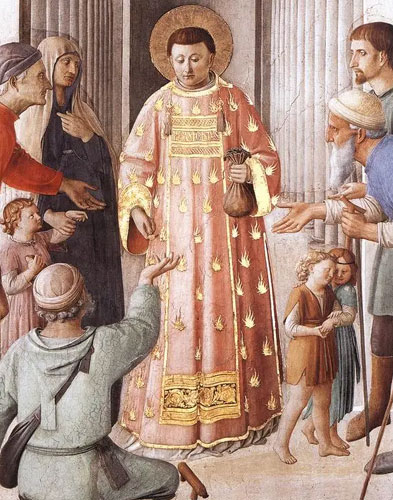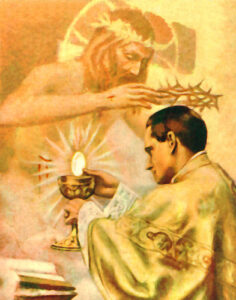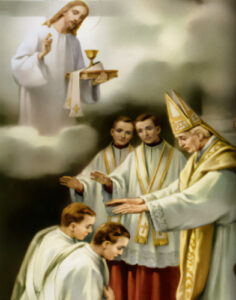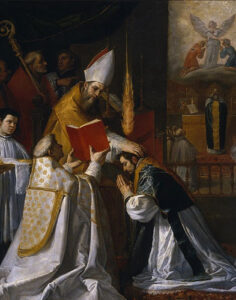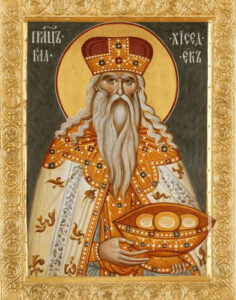A. Institution of the Diaconate in the Church
The diaconate is a divine-apostolic institution, and not merely ecclesiastical; the order of the diaconate exists in the Church by the will of Jesus Christ, and deacons exist by apostolic institution, as the Second Vatican Council teaches: “The divinely established ecclesiastical ministry is exercised on different levels by those who from antiquity have been called bishops, priests and deacons.”[1]
The New Testament speaks of deacons in many places; for example:
- In their institution by the Apostles: At that time, as the number of disciples continued to grow, the Hellenists complained against the Hebrews because their widows were being neglected in the daily distribution. So the Twelve called together the community of the disciples and said, ‘It is not right for us to neglect the word of God to serve at table. Brothers, select from among you seven reputable men, filled with the Spirit and wisdom, whom we shall appoint to this task, whereas we shall devote ourselves to prayer and to the ministry of the word.’ The proposal was acceptable to the whole community, so they chose Stephen, a man filled with faith and the Holy Spirit, also Philip, Prochorus, Nicanor, Timon, Parmenas, and Nicholas of Antioch, a convert to Judaism. They presented these men to the apostles who prayed andlaid hands on them (Acts 6:1-6).
- In the testimony of Saint Paul to the Philippians: Paul and Timothy, slaves of Christ Jesus, to all the holy ones in Christ Jesus who are in Philippi, with the bishops and deacons (Phil 1:1).[2]
- Regarding the qualities that they should have: Similarly, deacons must be dignified, not deceitful, not addicted to drink, not greedy for sordid gain, holding fast to the mystery of the faith with a clear conscience. Moreover, they should be tested first; then, if there is nothing against them, let them serve as deacons (1 Tim 3:8-10).
- Furthermore, deacons’ diverse functions can already be seen in Rom 12:6-9: Since we have gifts that differ according to the grace given to us, let us exercise them: if prophecy, in proportion to the faith; if ministry, in ministering; if one is a teacher, in teaching; if one exhorts, in exhortation; if one contributes, in generosity; if one is over others, with diligence; if one does acts of mercy, with cheerfulness. Let love be sincere; hate what is evil, hold on to what is good.
Around the year 90, the Didache ordered the appointment of “bishops and deacons worthy of the Lord.”[3] Around the year 96 Saint Clement of Rome testified that the apostles instituted the bishops and deacons.[4] Saint Ignatius of Antioch, who died in 107, exhorted several times that the deacons be honored “like Jesus Christ.”[5] Saint Irenaeus spoke of Saint Stephen as the one “who was chosen the first deacon by the apostles.”[6]
It is on the basis of these and other texts, both in Sacred Scripture as well as in Tradition, that the Council of Trent defined the existence of the diaconate as a dogma, declaring the contrary position anathema: “If anyone were to say that in the Church there does not exist a hierarchy instituted by divine ordaining, that consists of the bishops, presbyters, and ministers, let him be anathema.” Obviously, by saying ministers, deacons are included as they are the ministers of the level that is right under that of priests.
B. The Sacrament of Holy Orders
The Catholic faith teaches that there is only one sacrament of orders[7] but, at the same time, that there are three sacramental orders instituted by Jesus Christ. How can this plurality of orders be harmonized with the unity of the sacrament of orders? The episcopacy, the presbyterate, and the diaconate are potential parts of the sacrament of orders; they participate, according to the different degrees, in the perfection of orders in such a way that the perfection is found fully in one of its parts–the episcopacy–and in a limited way in the others, insofar as they draw near to the first.
In this way, authority is divided: one level completely possesses it, as, for example, the Superior General possesses all authority in a religious order. Authority is then possessed more or less by the others in the measure that they come closer to him, such as provincials, vice-provincials, delegates, local superiors, and so on down the line.
This is why the sacrament of orders conserves its unity despite its plurality of levels: the episcopacy, presbyterate, and diaconate. Its potential parts are not identical, as they differ from each other like the ranks of a hierarchy; the higher levels contain the augmented perfections of the preceding ones, until finally we reach the highest degree in which the greatest perfection is contained eminently. The Catechism of the Catholic Church teaches that “deacons share in Christ’s mission and grace in a special way. The sacrament of Holy Orders marks them with an imprint (‘character’) which cannot be removed and which configures them to Christ, who made himself the ‘deacon’ or servant of all.[8]8
C. The Diaconate is not the Ministerial Priesthood
Now then, in the triple plurality of orders, “there are two degrees of ministerial participation in the priesthood of Christ: the episcopacy and the presbyterate. The diaconate is intended to help and serve them.”[9]
Only the bishop lays his hands on the deacons, “not in the order of the priesthood, but rather in the order of ministry”[10] or service. The Second Vatican Council states that “deacons are ordained for the ministry and serve the people of God in communion with the bishop and his presbyterate.”[11] As Saint Hippolytus’s Apostolic Tradition reads, “The reason that only the bishop imposes hands is because the deacon is not ordained for the priesthood, but rather to the service of the bishop, in order to do what the bishop orders.”[12] He adds that the deacon does not receive the spirit common to the priesthood, but rather a spirit that confides him to the authority of the bishop. More precisely, the deacon is not ordained to the priestly task of the bishop, but rather participates in the bishop’s diaconal office, so that the sacramental character of the diaconate can be called a bond with the diaconal character of the priesthood of Christ, the Ebed-Yahweh of the Canticle of Isaiah, the servant of the Father and of men. Saint Ignatius of Antioch stated that “deacons are imitators of Christ because they are servants of the bishop, as Christ is the servant of God the Father.” He then adds, “To the deacons has been confided the ‘diaconate’ of Christ.”[13] As another author comments, “The diaconate is, in the diverse spheres of its ministry, properly the servant form of the priesthood.” Notwithstanding the sacred character of the diaconate, that is, the extrinsic designation, it is sometimes said that deacons “constitute a third priesthood.”[14]
In the Mystical Body of Christ, there is the common priesthood of all the baptized faithful and, with an essential difference (and not merely a difference of degree), the ministerial priesthood. This last priesthood is differentiated into two groups: the higher– the episcopacy–and the second degree–the presbyterate.
D. Diaconal Offices
In the New Testament, diakonia means to perform a service ordered to salvation.[15] The Apostles reserved to themselves the diakonia of the Word (Acts 6:4). Peter said that Judas participated in the apostolic diakonia (Acts 1:17), and Matthias is called to replace him in that diakonia (Acts 1:26). Saint Paul finishes the diakonia received from Jesus (Acts 20:24). Among these we have the diakonia of reconciliation (2 Cor 5:18), the diakonia of building up the body of Christ (Eph 4:12), and the diakonia of Christ (1 Tim 1:12). Thus the Apostles are the deacons of a new covenant (2 Cor 3:6), deacons of God (2 Cor 6:14), deacons of justice (2 Cor 11:12-15), deacons of the Gospel (Eph 3:7, Col 1:23), and deacons of the Body of Christ, which is the Church (Eph 3:7, Col 1:23). Saint Paul even calls Christ Himself a deacon (Rom 15:8).
In the Motu Propio Sacrum Diaconatus Ordinem (June 18th, 1967), Pope Paul VI indicated the cultural and liturgical offices of deacons, and the services that concern them in the works of preaching, charity, and apostolate: “It pertains to the deacon:
- To assist the bishop and the priest during liturgical actions in all things which the rituals of the different orders assign to him;
- To solemnly administer baptism;
- To reserve the Eucharist and to distribute it to himself and to others, to bring it as a Viaticum to the dying, and to impart to the people benediction with the Blessed Sacrament;
- In the absence of a priest, to assist at and to bless marriages in the name of the Church by delegation from the bishop or pastor;
- To administer sacramentals and to officiate at funeral and burial services;
- To read the sacred books of Scripture to the faithful and to instruct and exhort the people;
- To preside at the worship and prayers of the people when a priest is not present;
- To direct the liturgy of the word, particularly in the absence of a priest;
- To carry out the duties of charity and of administration as well as works of social assistance;
- To guide legitimately, in the name of the parish priest and of the bishop, remote Christian communities;
- To promote and sustain the apostolic activities of laymen.”[16]
We must pray, today and always, for all the ministers of the Church, so that we might be servants of God and of our brothers; in the end, the diaconal character configures the deacon’s soul to Christ who is also a deacon, as He is the Servant of God and of men.
[1] Ecumenical Second Vatican Council, Dogmatic Constitution on the Church, Lumen Gentium, 2 .
[2] The NAB uses the words overseers and ministers instead of bishops and deacons, but the Greek words used here are episkopos and diakonos.
[3] Didache, 15.
[4] 1 Clem, 42, 2.
[5] The Epistle of Ignatius to the Trallians, 7, 2; The Epistle of Ignatius to the Magnesians, 2; The Epistle of Ignatius to the Philadelphians, 11.
[6] Adversus haereses, 3, 12, 10.
[7] Cfr. Pius XII, Apostolic Constitution Sacramentum Ordinis, 1.
[8] Catechism of the Catholic Church, n. 1570.
[9] Catechism of the Catholic Church, n. 1554.
[10] Constitution Ecclesiae Aegyptiae, III, 2.
[11] Ecumenical Second Vatican Council, Decree Concerning the Pastoral Office of Bishops in the Church, Christus Dominus, 15.
[12] Apostolic Tradition, 8.
[13] Cfr. M.U. Carretero, Comentarios a la Constitución sobre la Iglesia (Madrid 1966) 596.
[14] Optato de Milevi, cited by M.U. Carretero, Comentarios a la Constitución sobre la Iglesia (Madrid 1966) 593.
[15] Cfr. Heb. 20:24.
[16] Cfr. n. 22

